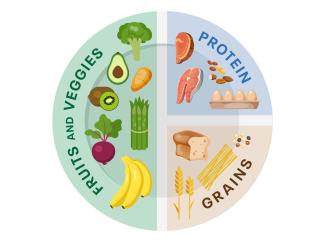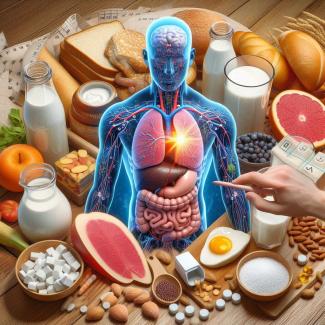
Potassium is essential for human health, and it plays several important roles in the body. Here's an overview of what potassium does for humans:
- Electrolyte Balance: Potassium is one of the body's major electrolytes, along with sodium and chloride. Electrolytes help maintain the balance of fluids in and around cells. They are crucial for nerve function, muscle contraction, and maintaining proper cellular function.
- Nerve Function: Potassium ions are critical for the transmission of nerve impulses. They help generate electrical signals that allow nerves to communicate with one another and with muscles. This is essential for functions like muscle movement, reflexes, and the functioning of the central nervous system.
- Muscle Contraction: Potassium plays a central role in muscle contractions, including those of the heart. Adequate potassium levels are necessary for a regular and healthy heartbeat. It helps control the rhythm of the heart and ensures that the heart muscles contract in a coordinated manner.
- Blood Pressure Regulation: Potassium helps regulate blood pressure by balancing the effects of sodium. A diet high in potassium and low in sodium can help lower blood pressure and reduce the risk of hypertension. High blood pressure is a significant risk factor for heart disease and stroke.
- Fluid Balance: Potassium helps maintain proper fluid balance in the body. It works in conjunction with sodium to regulate the distribution of fluids in and out of cells. This balance is essential for cell health and overall bodily functions.
- Acid-Base Balance: Potassium also plays a role in maintaining the body's acid-base balance, which is important for pH regulation and overall health.
- Kidney Function: The kidneys play a crucial role in regulating potassium levels in the body. They filter excess potassium from the bloodstream and excrete it in the urine. Kidney dysfunction can lead to imbalances in potassium levels.
- Energy Metabolism: Potassium is involved in energy metabolism at the cellular level, helping convert glucose into energy that cells can use.
It's important for individuals to consume an adequate amount of potassium through their diet to support these essential bodily functions. Common dietary sources of potassium include fruits (e.g., bananas, oranges, and avocados), vegetables (e.g., potatoes, spinach, and tomatoes), legumes, nuts, and whole grains. A balanced diet that includes these foods can help ensure that you maintain proper potassium levels for overall health and well-being.
However, too much or too little potassium can be harmful. An imbalance in potassium levels can lead to health issues, such as muscle weakness, irregular heart rhythms, or even cardiac arrest. Therefore, it's important to maintain a balanced intake of potassium to support the body's various functions and overall health.
Answers to frequently asked questions about potassium
Certainly, here are answers to some frequently asked questions about potassium:
- What is potassium? Potassium is a chemical element with the symbol K and atomic number 19. It is an essential mineral and electrolyte that plays a crucial role in various physiological processes in the human body.
- Why is potassium important for the body? Potassium is vital for maintaining proper nerve and muscle function, regulating blood pressure, and balancing bodily fluids. It is also essential for energy metabolism and maintaining the body's acid-base balance.
- What are dietary sources of potassium? Common dietary sources of potassium include fruits (e.g., bananas, oranges), vegetables (e.g., potatoes, spinach), legumes, nuts, and whole grains. A balanced diet typically provides an adequate amount of potassium.
- How much potassium do I need daily? The recommended daily intake of potassium for adults is typically around 2,600-3,400 milligrams (mg), but individual requirements can vary based on factors like age, sex, and activity level.
- What happens if I don't get enough potassium? A deficiency of potassium (hypokalemia) can lead to symptoms such as muscle weakness, fatigue, abnormal heart rhythms, and, in severe cases, paralysis. It can be caused by inadequate dietary intake, certain medical conditions, or medication use.
- Can I get too much potassium? Yes, excessive potassium intake (hyperkalemia) can be harmful and may lead to heart arrhythmias, muscle weakness, or even cardiac arrest. It can be caused by kidney dysfunction, certain medications, or excessive potassium supplementation.
- How can I maintain a healthy potassium balance? Maintaining a balanced diet with a variety of potassium-rich foods can help ensure you get the right amount of potassium. Be mindful of sodium intake, as a high-sodium diet can affect potassium levels. If you have specific dietary concerns or health conditions, consult with a healthcare provider.
- Are there medical uses for potassium? Potassium supplements are commonly used in healthcare settings to treat or prevent low potassium levels in the body. They are also used to induce cardiac arrest in lethal injection procedures.
- Can I take potassium supplements on my own? It's generally not recommended to take potassium supplements without the guidance of a healthcare professional, as improper use can lead to imbalances that can be harmful.
- What are the symptoms of potassium imbalance? Symptoms of low potassium (hypokalemia) may include muscle weakness, fatigue, irregular heartbeat, and muscle cramps. High potassium levels (hyperkalemia) can cause muscle weakness, numbness, and potentially life-threatening heart arrhythmias.
Remember that individual potassium needs and tolerance levels can vary, so it's important to consult with a healthcare provider if you have concerns about your potassium intake or if you experience any symptoms of imbalance.
Potassium symptoms
Potassium levels in the body are tightly regulated, and both low and high potassium levels can lead to a range of symptoms and health issues. Here are the symptoms associated with both low potassium (hypokalemia) and high potassium (hyperkalemia):
Symptoms of Low Potassium (Hypokalemia):
- Muscle Weakness: Weakness and fatigue, particularly in the muscles, are common early signs of low potassium levels.
- Muscle Cramps: Painful muscle cramps and spasms, especially in the legs, are often experienced.
- Tingling and Numbness: A sensation of tingling or numbness, known as paresthesia, can occur in the extremities.
- Fatigue: Generalized fatigue, weakness, and a sense of lethargy may be present.
- Irregular Heartbeat: Low potassium levels can lead to abnormal heart rhythms, palpitations, or a sensation of "heart racing."
- Constipation: Gastrointestinal symptoms like constipation may occur.
- Frequent Urination: Increased urination (polyuria) can be a symptom of hypokalemia.
- Thirst: An increased feeling of thirst can accompany low potassium levels.
- Muscle Paralysis (Severe Cases): In severe cases, severe hypokalemia can cause muscle paralysis, which can affect the respiratory muscles and lead to breathing difficulties.
Symptoms of High Potassium (Hyperkalemia):
- Muscle Weakness: Similar to hypokalemia, hyperkalemia can also cause muscle weakness, often starting in the legs.
- Irregular Heartbeat: One of the most dangerous symptoms of hyperkalemia is the risk of life-threatening cardiac arrhythmias, such as ventricular fibrillation.
- Nausea and Vomiting: Gastrointestinal symptoms like nausea and vomiting can occur.
- Tingling and Numbness: Paresthesia, a tingling or numbness sensation, may be present.
- Confusion: Changes in mental status, confusion, and disorientation can result from high potassium levels.
- Difficulty Breathing: Severe hyperkalemia can affect the muscles involved in breathing and lead to breathing difficulties.
- Chest Pain: Chest pain or discomfort may be experienced.
- Weak Pulse: In some cases, the pulse may become weak or irregular.
- Cardiac Arrest (Severe Cases): Extremely high potassium levels can lead to cardiac arrest if not promptly treated.
It's important to note that potassium imbalances are typically diagnosed through blood tests. If you suspect you have symptoms related to potassium imbalance or have a medical condition or are taking medications that could affect your potassium levels, it's crucial to seek medical attention. Correcting potassium imbalances should be done under the guidance of a healthcare professional, as both low and high potassium levels can have serious health consequences.
Potassium causes
Potassium is an essential mineral that is required for various bodily functions, and it generally has beneficial effects on the body when consumed in appropriate amounts as part of a balanced diet. However, both deficiency and excess of potassium can lead to health issues. Here are some of the causes associated with potassium imbalances:
- Hypokalemia (Low Potassium Levels):
- Inadequate Dietary Intake: Not consuming enough potassium-rich foods can lead to low potassium levels.
- Excessive Losses: Conditions that cause excessive loss of potassium through vomiting, diarrhea, or excessive sweating can lead to hypokalemia.
- Certain Medications: Some medications, such as diuretics (water pills), can increase potassium excretion, potentially leading to low levels.
- Medical Conditions: Certain medical conditions, including kidney disorders and eating disorders, can contribute to low potassium levels.
- Excessive Alcohol or Caffeine Intake: Overconsumption of alcohol or caffeine can lead to potassium loss.
- Hyperkalemia (High Potassium Levels):
- Kidney Dysfunction: Impaired kidney function is a common cause of hyperkalemia, as the kidneys are responsible for excreting excess potassium.
- Medications: Some medications, like potassium-sparing diuretics, ACE inhibitors, or angiotensin receptor blockers (ARBs), can increase potassium levels when not properly managed.
- Dietary Supplements: Excessive use of potassium supplements or salt substitutes containing potassium can lead to elevated potassium levels.
- Tissue Injury or Cell Damage: Injuries, burns, or cell damage can cause the release of potassium from cells into the bloodstream.
- Certain Medical Conditions: Certain medical conditions, such as adrenal insufficiency or metabolic acidosis, can lead to hyperkalemia.
- Dehydration: Severe dehydration can concentrate potassium in the blood and lead to high levels.
It's important to maintain a balance of potassium in the body, as both hypo- and hyperkalemia can have serious health consequences. Potassium imbalances are typically diagnosed through blood tests, and treatment may involve dietary adjustments, changes in medication, or medical interventions, depending on the underlying cause and severity of the condition.
If you suspect you have a potassium imbalance or have concerns about your potassium levels, it's essential to consult with a healthcare professional for proper diagnosis and guidance.
Potassium risk factors
Risk factors associated with potassium imbalances, specifically hypokalemia (low potassium levels) and hyperkalemia (high potassium levels), can vary depending on the individual's health, lifestyle, and medical conditions. Here are some common risk factors for potassium imbalances:
Risk Factors for Hypokalemia (Low Potassium Levels):
- Dietary Habits: A diet low in potassium-rich foods, such as fruits, vegetables, and legumes, can increase the risk of hypokalemia.
- Excessive Fluid Loss: Conditions that cause excessive loss of fluids and electrolytes, such as prolonged vomiting, diarrhea, or heavy sweating, can lead to potassium depletion.
- Certain Medications: Some medications, including diuretics (water pills), laxatives, and corticosteroids, can increase potassium excretion and raise the risk of hypokalemia.
- Medical Conditions: Certain medical conditions, like kidney disease, eating disorders, and malabsorption disorders, can interfere with potassium absorption and contribute to low levels.
- Alcohol and Caffeine: Excessive alcohol and caffeine consumption can lead to potassium loss through increased urination.
- Age: Elderly individuals may be at a higher risk of hypokalemia due to age-related changes in kidney function and dietary habits.
- Pregnancy: Pregnant women may be more susceptible to hypokalemia due to increased potassium needs during pregnancy.
- Eating Disorders: Conditions such as anorexia nervosa and bulimia nervosa can lead to electrolyte imbalances, including hypokalemia, due to restricted food intake and purging behaviors.
Risk Factors for Hyperkalemia (High Potassium Levels):
- Kidney Disease: Impaired kidney function is one of the most common risk factors for hyperkalemia, as the kidneys are responsible for excreting excess potassium from the body.
- Certain Medications: Some medications, like potassium-sparing diuretics, ACE inhibitors, and angiotensin receptor blockers (ARBs), can raise potassium levels when not properly managed.
- Dietary Supplements: Excessive use of potassium supplements or salt substitutes containing potassium can increase the risk of hyperkalemia.
- Tissue Injury or Cell Damage: Trauma, burns, or cell damage (as in rhabdomyolysis) can cause the release of potassium from cells into the bloodstream.
- Dehydration: Severe dehydration can concentrate potassium in the blood, leading to elevated levels.
- Metabolic Disorders: Conditions like adrenal insufficiency, metabolic acidosis, and certain inherited metabolic disorders can disrupt potassium balance.
- Aging: Older adults may have a higher risk of hyperkalemia due to age-related kidney changes and the use of medications to manage chronic health conditions.
- Chronic Health Conditions: Certain chronic conditions, such as heart failure or diabetes, may increase the risk of hyperkalemia.
It's important to note that individual risk factors and susceptibility to potassium imbalances can vary widely. If you have concerns about your potassium levels or are at risk of developing a potassium imbalance due to any of the factors mentioned above, it is advisable to consult with a healthcare professional. Regular monitoring and appropriate management are essential to maintain potassium balance and overall health.
How to treat potassium - diagnostic and testing
The treatment of potassium imbalances, whether it's hypokalemia (low potassium levels) or hyperkalemia (high potassium levels), depends on the underlying cause and severity of the condition. Diagnosis and testing play a crucial role in determining the appropriate treatment. Here's how potassium imbalances are typically diagnosed and treated:
Diagnosis:
- Medical History and Physical Examination: A healthcare provider will begin by taking a detailed medical history and conducting a physical examination. They will ask about your symptoms, medical conditions, medications, and dietary habits.
- Blood Tests: Blood tests are the primary diagnostic tool for assessing potassium levels. A basic metabolic panel (BMP) or comprehensive metabolic panel (CMP) can measure potassium levels in the blood. These tests also provide information about other electrolytes, kidney function, and overall metabolic health.
- Urine Tests: Urine tests may be performed to assess potassium excretion and kidney function. A 24-hour urine collection may be needed in some cases.
- Electrocardiogram (ECG or EKG): An ECG may be done to evaluate the electrical activity of the heart, especially in cases of severe potassium imbalances, as it can affect heart rhythms.
- Additional Tests: Depending on the suspected cause, your healthcare provider may order additional tests, such as imaging studies or further blood tests to identify underlying medical conditions.
Treatment:
The treatment approach for potassium imbalances will vary based on whether the imbalance is hypokalemia or hyperkalemia:
Hypokalemia (Low Potassium):
- Dietary Changes: If hypokalemia is due to inadequate dietary intake, increasing potassium-rich foods may be sufficient. Foods like bananas, oranges, potatoes, and spinach are good sources of potassium.
- Potassium Supplements: In cases of moderate to severe hypokalemia, potassium supplements may be prescribed. These should be taken as directed by a healthcare provider.
- Address Underlying Causes: Treating the underlying causes of hypokalemia, such as managing medical conditions or adjusting medications, is essential.
Hyperkalemia (High Potassium):
- Dietary Modifications: Reducing high-potassium foods from the diet may help lower potassium levels. Foods like bananas, oranges, potatoes, and tomatoes should be limited.
- Medication Adjustments: If hyperkalemia is related to medications, the healthcare provider may adjust or discontinue the offending drugs.
- Potassium-Binding Medications: Medications called potassium binders, such as sodium polystyrene sulfonate, can help remove excess potassium from the body.
- Dialysis: In severe cases of hyperkalemia, particularly when it's life-threatening, emergency hemodialysis may be necessary to quickly remove excess potassium from the bloodstream.
- Treat Underlying Conditions: Treating any underlying medical conditions contributing to hyperkalemia is essential. This may involve managing kidney disease or addressing metabolic disorders.
Both hypokalemia and hyperkalemia should be treated under the guidance of a healthcare professional, as they can have serious health consequences. Treatment is individualized based on the specific circumstances and should address the underlying causes while stabilizing potassium levels within the target range. Regular follow-up and monitoring are typically necessary to ensure potassium balance and overall health.
Potassium questions for your doctor
If you have questions or concerns about potassium and its role in your health, it's a good idea to discuss them with your healthcare provider. Here are some questions you might consider asking your doctor:
- **What is the normal range for potassium levels in the blood, and what are the consequences of having levels that are too high or too low?
- **How are potassium levels measured, and what do the results of a potassium blood test indicate about my health?
- **Are there any specific dietary recommendations or restrictions related to potassium that I should be aware of based on my medical history or any conditions I have?
- **What are the common symptoms of a potassium imbalance, such as hypokalemia or hyperkalemia, and when should I seek medical attention if I experience these symptoms?
- **What factors can contribute to low potassium levels, and what can be done to address or prevent hypokalemia?
- **What are the risk factors for high potassium levels, and how can hyperkalemia be managed or prevented?
- **Are there any medications or medical conditions that could affect my potassium levels, and how should they be managed to ensure a healthy potassium balance?
- **Should I be concerned about the interaction between potassium and any medications I am currently taking?
- **Are there specific dietary or lifestyle changes I should make to ensure I maintain an appropriate potassium balance?
- **How frequently should I have my potassium levels monitored, and what should I do if my levels are outside the normal range?
- **What are the potential consequences of long-term or chronic potassium imbalances on my overall health and well-being?
- **Are there any preventive measures or habits that can help me maintain a healthy potassium balance and prevent future imbalances?
Remember to have an open and honest discussion with your healthcare provider about your concerns, medical history, and any symptoms you may be experiencing. Your doctor can provide personalized guidance and recommendations based on your specific situation.
Potassium treatment
The treatment for potassium imbalances, whether it's hypokalemia (low potassium levels) or hyperkalemia (high potassium levels), varies depending on the underlying cause and the severity of the condition. Here's an overview of the treatment approaches for each:
Hypokalemia (Low Potassium Levels):
- Dietary Changes: If hypokalemia is due to inadequate dietary intake, the first step is often to increase your consumption of potassium-rich foods. These include bananas, oranges, potatoes, spinach, and other fruits and vegetables.
- Potassium Supplements: In cases of moderate to severe hypokalemia, potassium supplements may be prescribed. These supplements are available in various forms, including oral tablets and liquids. It's important to take these supplements as directed by your healthcare provider, as excessive potassium intake can be harmful.
- Address Underlying Causes: Treating the underlying causes of hypokalemia is crucial. For example, if it is related to a medical condition like kidney disease, managing that condition may help improve potassium levels.
- Medication Adjustments: In some cases, healthcare providers may need to adjust or discontinue medications that contribute to potassium loss, such as diuretics or laxatives.
Hyperkalemia (High Potassium Levels):
- Dietary Modifications: Reducing high-potassium foods from your diet can help lower potassium levels. This may include limiting or avoiding foods like bananas, oranges, potatoes, tomatoes, and salt substitutes containing potassium.
- Medication Adjustments: If hyperkalemia is related to medications you are taking, your healthcare provider may adjust or discontinue these drugs. Common culprits include potassium-sparing diuretics, ACE inhibitors, and angiotensin receptor blockers (ARBs).
- Potassium-Binding Medications: Your doctor may prescribe medications called potassium binders, such as sodium polystyrene sulfonate, which can help remove excess potassium from your body.
- Dialysis: In severe cases of hyperkalemia, particularly when it's life-threatening, emergency hemodialysis may be necessary to quickly remove excess potassium from your bloodstream.
- Treat Underlying Conditions: If an underlying medical condition, such as kidney disease or metabolic disorders, is contributing to hyperkalemia, treating that condition is essential.
- Hydration: Intravenous (IV) fluids may be administered to help dilute potassium in the bloodstream.
Both hypokalemia and hyperkalemia should be treated under the guidance of a healthcare professional, as they can have serious health consequences. Treatment is individualized based on the specific circumstances and should address the underlying causes while stabilizing potassium levels within the target range.
It's important to follow your doctor's recommendations and attend regular follow-up appointments to ensure your potassium levels remain in a healthy balance. Monitoring and managing your potassium levels are essential for overall health and well-being.
Potassium outlook
The "potassium outlook on humans" typically refers to the projected or expected impact of potassium on human health and well-being. Potassium is an essential mineral with various roles in the human body, particularly in maintaining proper nerve and muscle function, regulating blood pressure, and balancing bodily fluids. Here are some key considerations related to the potassium outlook on humans:
- Health Benefits: Potassium is crucial for overall health. It plays a role in maintaining heart health, reducing the risk of hypertension, and supporting proper muscle and nerve function.
- Dietary Recommendations: Health authorities provide recommended daily intakes for potassium, which can vary by age, sex, and other factors. Meeting these recommendations through a balanced diet is important for maintaining good health.
- Dietary Sources: Fruits, vegetables, legumes, nuts, and whole grains are common dietary sources of potassium. Including these foods in your diet is essential for meeting potassium needs.
- Balancing Sodium and Potassium: Maintaining a balance between sodium (salt) and potassium intake is important for overall cardiovascular health. A diet high in sodium and low in potassium can increase the risk of high blood pressure and related health issues.
- Hypokalemia and Hyperkalemia: Understanding the symptoms and risks of potassium imbalances, including hypokalemia (low potassium) and hyperkalemia (high potassium), is essential. These conditions can have various health consequences and should be treated under the guidance of a healthcare professional.
- Individual Health Factors: The impact of potassium on an individual's health can vary based on factors such as age, sex, medical history, and medications. It's essential to consider these factors when assessing the potassium outlook for a specific person.
- Health Conditions: Certain medical conditions, such as kidney disease, can affect how the body processes potassium. Managing these conditions and monitoring potassium levels are important for overall health.
- Preventive Measures: Incorporating potassium-rich foods into your diet, adopting a balanced and healthy eating pattern, and reducing sodium intake are preventive measures for maintaining a healthy potassium outlook.
- Consulting Healthcare Professionals: If you have concerns about your potassium intake or if you are at risk of potassium imbalances due to a medical condition or medications, consulting with a healthcare provider is advisable.
The potassium outlook on humans is generally positive when individuals maintain a balanced diet and healthy lifestyle, including physical activity and adequate hydration. Proper potassium intake and balance contribute to overall health and well-being, particularly in terms of cardiovascular health and muscle and nerve function. However, individual variations and health factors should always be taken into account, and medical advice should be sought when necessary.






